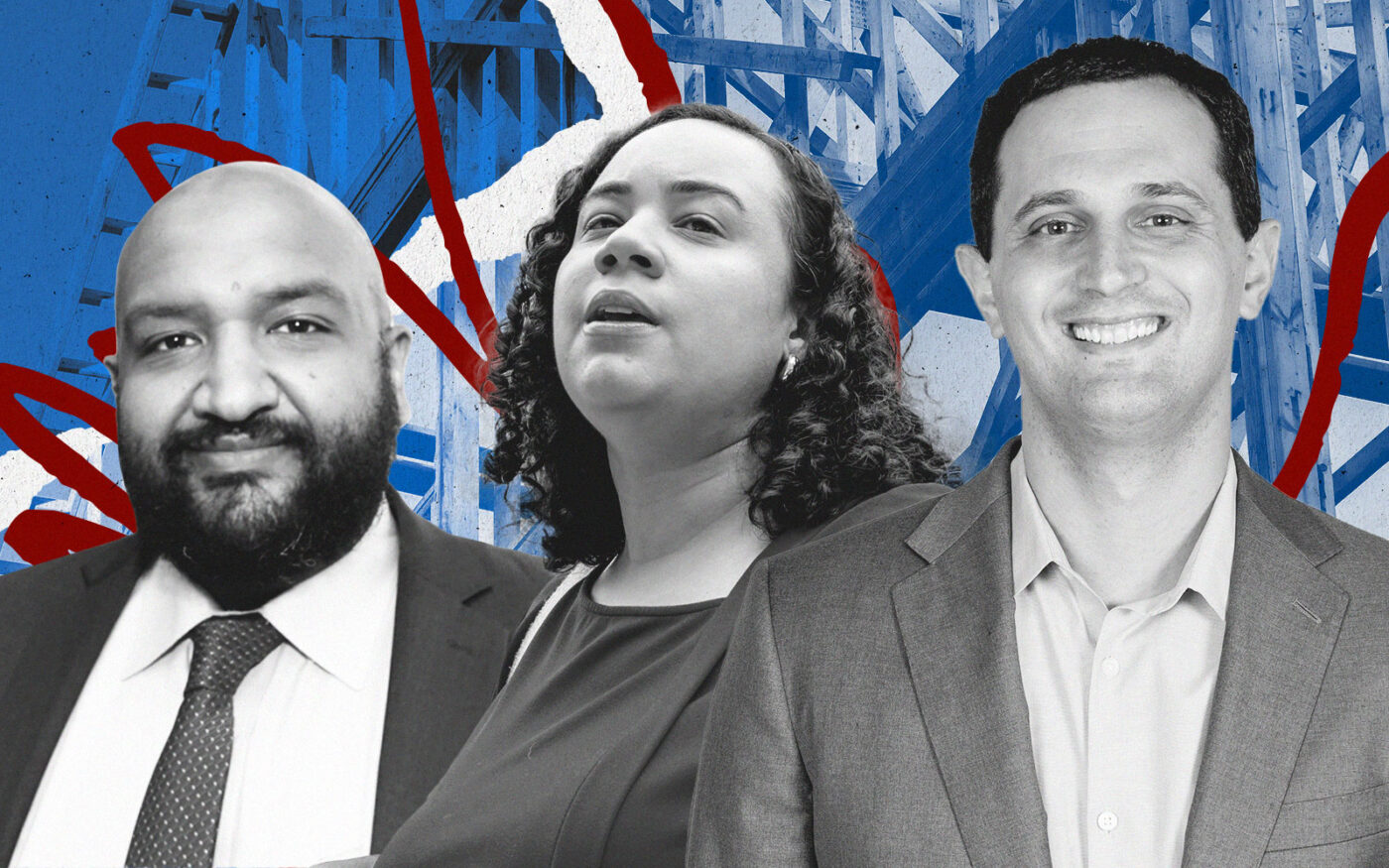Union construction laborers want wage requirements to apply to city-funded housing projects, but the Adams administration says setting a floor would cost hundreds of millions of dollars and work against its goals to ramp up housing production.
The Construction Justice Act, a City Council measure backed by the Mason Tenders’ District Council, would mandate wages and benefits worth at least $40 per hour on certain housing projects financed with city subsidies.
The measure would cost the city more than $500 million to maintain its current level of production, Ahmid Tagani, first deputy commissioner of the Department of Housing Preservation and Development, said during a hearing held by the City Council’s Committee on Civil Service and Labor.
“New wage requirements can be the difference between some projects being financially feasible versus infeasible,” Tagani said in his testimony. “They may discourage would-be developers from participating in our subsidized projects, limiting our pool of experienced partners and preventing new and smaller developers from entering the field, such as non-profits and minority- and women-owned business enterprises.”
The bill would kick in for projects that receive public financing worth $1 million or more, that have 100 or more units and have construction or demolition costs of $3 million or more. Loans, grants or cheap land would qualify as city financing in this context, whereas tax exemptions and abatements would not count.
HPD estimates that the bill would slash housing production by 1,000 to 2,500 units each year. Tagani said the new wage requirements would force “difficult tradeoffs,” potentially leading HPD to build fewer homes for the lowest-income New Yorkers and fewer for-sale units, which are the two most expensive types of projects the agency finances.
In response, bill sponsor and Council member Carmen De La Rosa expressed frustration that the Adams administration is asking the City Council to “be bold” and approve the City of Yes for Housing Opportunity to ramp up housing production, but is not, in turn, acting “boldly” on behalf of workers.
“The conversation pits those two needs against each other,” she said.
The mention of City of Yes comes as the City Council reviews the mayor’s signature housing policy. The Council will likely demand changes before approving the proposal, and given the mayor’s legal troubles, the body’s members may feel more emboldened to amend the plan extensively.
In other words, the mayor may want to pick his battles when it comes to opposing legislation that has broad support in the Council. As of Monday, the bill has 34 sponsors, which is a veto-proof majority.
The Real Estate Board of New York echoed the administration’s concerns in its testimony. This year, as part of state budget negotiations, the group reached an agreement with the laborers’ union to set a similar wage threshold for projects that receive the property tax break 485x. That wage floor applied to projects with 100 or more units citywide. Higher wage requirements kick in for larger projects in parts of Manhattan, Queens and Brooklyn.
A key difference between that deal and the Construction Justice Act is that 485x projects have a mix of market rate and affordable units, whereas HPD-funded projects are largely 100 percent affordable or close to it. So in 485x projects, the market rate units can help cover the increase in construction costs, though some developers have said that they expect builders to do everything they can to avoid paying the higher wages under 485x, too.
REBNY’s Zach Steinberg argued for wage standards to be calibrated to keep construction moving. “If a project becomes financially infeasible due to higher regulatory burdens, those same workers will not have a job in the first place and the City will lose out on the affordable housing it urgently needs,” he wrote in prepared testimony.
The measure would also require that at least 30 percent of the hours worked on a project be done by workers who live in areas where at least 15 percent of the people in a ZIP code are below the federal poverty rate or are residents of public housing.
REBNY said the wage threshold needs to be lowered and asked that wage-reporting requirements also be toned down. The group previously showed conceptual support for the measure, in light of a separate bill promoted by the New York City District Council of Carpenters, which called for even higher wages.
Baricka Williams, executive director of the Association for Neighborhood & Housing Development, which represents nonprofit developers, said the bill was unworkable because it did not come with a capital commitment from the City Council. Mutual Housing New York, a nonprofit affordable housing developer, submitted testimony supporting the measure but called for a few carve outs for projects on scattered sites.
Oona Adams, director of organizing for laborers’ union, Local 79, dismissed “doomsday claims” that the wage floor would be cost-prohibitive.
“Market precedent clearly exists for paying construction workers a $40 per hour wage package to build city-subsidized affordable housing,” she testified, saying other “responsible” contractors and developers have paid workers such wages. “But it’s time to move beyond a project-by-project, market-driven approach to raising wages.”
The laborers’ union has reached deals with developers on individual affordable housing projects, an arena in which the union has really struggled to hold onto market share.
A number of construction workers testified on Monday in favor of the bill.
“All of us are risking our lives every day,” said Aasim Martin, who has worked for masonry and demolition companies. “We deserve safe jobs that treat us fairly and pay at least $40 an hour.”
Read more



